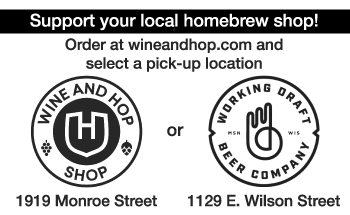by Johanna Doren, FairShare CSA Coalition
There are plenty of mixed messages about fad diets, eating “naturally,” and buying organic—it’s hard to know the best choice for your health and the planet. At FairShare CSA Coalition, we stand by local, organic food produced right in our community by our 50 member farms. Each of these farmers is invested in producing quality food, stewarding the environment, and strengthening the local economy. Who better to learn about the importance of eating local than from the farmers themselves? We asked FairShare-endorsed farms that source to the Co-op why this choice is so impactful. Along the way, they gave us some insider tips on how to spot a farmer from afar.
WESTRIDGE ORGANIC PRODUCE
Kim & Jake Jakubowski; Blue River, WI
“You are what you eat, and chemicals can’t be rinsed off.”
As a small farmer, the only way that we can be supported is if everyone eats locally. It keeps small family farms in business, and keeps the money in the community, allowing us to do what we love, and make a living at it.
In addition, all the harsh chemicals [used in non-organic production] are destroying the ecosystem. These chemicals don’t just affect the farmers and their neighbors, it all flows downstream and is making a huge impact on the ocean, as well as everyone’s water supply and air quality. You are what you eat, and those chemicals can’t be rinsed off.
TWO ONION FARM
Chris & Juli McGuire; Belmont, WI
“Your dollars directly support our family.”
Small family farms, like ours, depend 100% on locavores. Your local food dollars directly support our family. Thank you! When consumers buy organically grown food, they support farms that conserve soil, water, and wildlife, and they eat food grown without harmful pesticides.
KINGS HILL FARM
Elisabeth Minich & Steven Shoemaker; Mineral Point, WI
“Support your neighbors and help your community.”
Eating locally means supporting your Wisconsin farmers. We’re your country neighbors! Support your neighbors and help your community. Simple!
DRIFTLESS ORGANICS
Josh Engel, Noah Engel & Mike Lind; Soldiers Grove, WI
“Keep our food out of the greedy paws of big corporations.”
By eating locally, you are making the choice to help support small farmers like us, who are trying our very best to maintain control of the food we eat, how it is grown, and how it is distributed. This is true food security! The more everyone chooses to support the little guys (who tend to be the ones growing for local markets), the more we can keep the control of our food out of the greedy paws of big corporations.
FAZENDA BOA TERRA
John Middleton & Lidia Dungue; Spring Green, WI
“Organic farmers seek to honor the natural environment.”
When that local food is organic you are supporting local farms that have verifiable sustainable practices. You are eating food that values not just you, the consumer, but the natural systems in which it is grown. All farming has some negative impact on the environment. But organic farmers strive to minimize that impact and enhance the natural world whenever possible. Organic farmers invest heavily in the care of the soil that sustains them and seek always to honor the natural environments in which it resides.
HARMONY VALLEY FARM
Richard, Andrea & Terri DeWilde; Viroqua, WI
“Transparency is important; we want consumers to see how their food is produced.”
We think it’s important for consumers to choose locally produced, certified organic food for several reasons. Having a relationship with the people who grow and produce your food allows you to ask questions and have more transparency about how your food is grown. Transparency is super important to us as we want consumers to see the “big picture” about how their food is produced and where it comes from. We also appreciate knowing the people who are eating the food we grow! It goes both ways!
CROSSROADS COMMUNITY FARM
Cassie & Mike Noltnerwyss; Cross Plains, WI
“Eating locally is one way to fight climate change.”
There’s a carbon footprint on every plate of food we eat. The more local the food, the smaller the carbon footprint. We all gotta eat, but eating locally is one way to fight climate change.
HOW TO BUY LOCAL AT THE CO-OP/IN MADISON
In the Co-op: Look for the purple signs that say “100% local.” When the produce label lists the state of origin and also the farm of origin, you’ve hit the jackpot.
Outside the Co-op: Join a CSA! This is one of the best ways to buy local and support local farms. You pay at the beginning of the season, then receive a weekly box of fresh vegetables from late spring through early fall. (Pssst: Many farms deliver in the winter, and now is the time to sign up! Visit www.csacoalition.org (link is external) to find your farm.)
Not looking to commit to one farm? Visit your local farmers’ market and buy directly from a variety of farmers.
EXTENDING BEYOND DANE COUNTY
CSAs, farmers’ markets, and community food co-ops exist outside of Madison, Dane County, and Wisconsin! Research the food markets in your area to find out where you can purchase local food and support the farmers near you.
FairShare CSA Coalition connects you with your farmer through Community Supported Agriculture. We envision a future where CSA is the backbone of a strong local food system and where all families have access to locally-produced, organic food from strong small family farms.
HOW TO SPOT A FARMER
“Real farmers are passionate about what they do. They may clean up good for the city visit, but you can see their sun soaked skin and their heart will always be in the field.”
-Kim Jakubowski, Westridge Organic Produce
“When asked about their favorite work-out place, they will send you to dig carrots or hoe the onions.”
-Juli McGuire, Two Onion Farm
“You can spot me at Willy Street by the dirty red wing boots and only buying cheese and fair trade coffee since I already have a farm full of veggies!”
-Elisabeth Minich, Kings Hill Farm
“[Farmers] are usually very tired, very dirty and most likely complaining about the weather in one way or another. Whether there’s not enough rain or too much rain, you’ll hear about it!”
-Mike Lind, Driftless Organics
“You can usually get a confirmed farmer ID by looking for someone with dirty, torn jeans, a well-worn and stained T-shirt, and an International Harvester hat, browsing the beer section at Willy North. Their arms, hands and face are likely to have dirt and/or grease on them and they will be seemingly unaware of it. Despite being slightly uncomfortable being out of their natural habitat, they will be friendly when approached, though tending towards slightly odorous and perhaps a bit confused.”
– John Middleton, Fazenda Boa Terra
“You can identify a “real farmer” when you talk to them. A real farmer will likely choose weather as the first topic of conversation.”
-Andrea Yoder, Harmony Valley Farm
“[You’ll recognize a farmer as someone] buying dairy, oils, and grains at the Willy Street Co-op on Saturday afternoons, still wearing their market aprons. OR you’ll see us at Menards or Farm and Fleet on rainy days.”
-Cassie Noltnerwyss, Crossroads Community Farm












